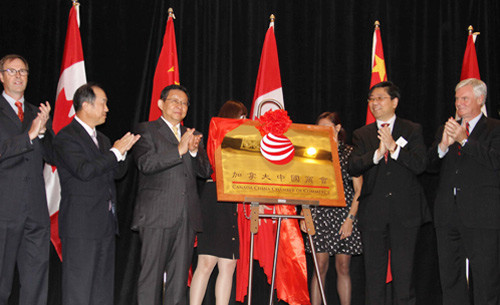|
 |
|
MORE BUSINESS: Chinese Commerce Minister Chen Deming (fourth left) and China's Ambassador to Canada Zhang Junsai (third left) attend the inaugural ceremony of the Canada China Chamber of Commerce, a non-profit business organization representing more than 100 Chinese companies, in Toronto on September 25 (MA DAN) |

At first glance, China and Canada would seem to be ideal trading partners. The Canadian economy is oriented heavily toward the export of natural resources and Prime Minister Stephen Harper has described the country as an "emerging energy superpower." China, on the other hand, is a manufacturing superpower with a voracious appetite for energy and raw materials to feed its thousands of factories and hundreds of growing cities. It would seem to be a match made in economic heaven.
The consensus among economists and trade analysts, however, has been that bilateral trade and investment have failed to live up to their potential. This is particularly true regarding Canadian exports to China. While China is Canada's second largest trading partner overall and ranks third among exporters behind the United States and the United Kingdom, Canada accounts for just 1 percent of Chinese imports and fails to crack the top 10 countries exporting goods to China. The result is chronic trade deficit that has risen to more than $30 billion a year, according to Canadian statistics.
Recognition of this problem has been a long time coming, but now, rather suddenly, both governments seem to have ambitious plans to expand trade and investment.
Last month, Zhang Junsai, Chinese Ambassador to Canada, said the two countries should begin talks on a free trade agreement.
"It's high time to begin the exploratory work on the possibility of a free trade agreement," he told The Globe and Mail. "Under a free trade agreement, there will be more and more trade and investment."
His comments came in the wake of the signing of a bilateral Foreign Investment Promotion and Protection Agreement, which was widely seen as a key step on the way to a more extensive trade relationship. Zhang's support for free trade also coincided with the high-profile bid by China National Overseas Oil Corp. (CNOOC) for Nexen Inc., an Alberta oil firm. The $15.1-billion takeover offer has already been approved by Nexen shareholders, but Canadian critics of the deal are suspicious of CNOOC's status as a state-owned company. It is not a conventional commercial enterprise, they say, but an arm of the Chinese Government.
Zhang dismissed these concerns. "We are not coming to control your resources," he told The Globe and Mail. "Business is business. It should not be politicized. If we politicize all this, then we cannot do business."
The Canadian Government is reviewing the takeover bid and will decide whether to approve it before the end of November. There are reports of divisions in the cabinet, but the prime minister is believed to be in favor. If that's true, perhaps it is no coincidence that even while critics of the Nexen deal were expressing their opposition in the media, word was filtering out of Ottawa that the Canadian Government, too, was considering free trade with China.
A prominently displayed report by National Post columnist John Ivison said an announcement on exploratory talks is expected to be made after the Canadian Government's review of the Nexen deal.
Ivison quoted Canadian trade consultant Peter Clark as saying, "Harper wants to do it. And I was in China three to four weeks ago talking to senior Chinese people and they are very positive. They see the advantage to them of getting Canada on side on certain product sectors where they cannot get the United States on side."
| 